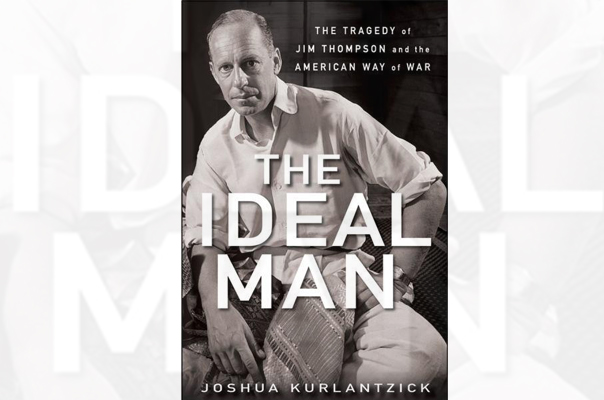The Ideal Man: The Tragedy of Jim Thompson

“Jim Thompson’s combination of mystery, power, idealism, glamor, and, eventually, failure, transfixed one generation after the next and led to continued interest in what happened to the Silk King. Thompson’s legend grew, at least among many people in Southeast Asia, within the CIA and among a group of amateur sleuths who treated the Thompson case like a miniature version of the theories surrounding the assassinations of John and Robert Kennedy,” writes author Joshua Kurlantzick.
Kurlantzick’s new book, The Ideal Man: The Tragedy of Jim Thompson and the American Way of War, is essentially an account of the most famous American personality in Southeast Asia during the early years of the Cold War. Thompson, a spy and a silk magnate raised in a well-heeled American family, first set foot in Thailand in 1943 as a member of the Office of Strategic Services, the US’s wartime intelligence service, leaving behind a comfortable life in his home state of Delaware.
At the end of World War II, Thompson thought that American idealism, based on the promotion of self-determination for all men, would allow him to make a difference in this region. Thus he strove to forge intimate ties with nationalist movements in Laos, Cambodia and Vietnam, with the goal of emancipating them from their ruthless colonial masters.
But like other regions, Southeast Asia was soon transformed into a battlefield of ideological conflict. The shift in international politics, which had a huge impact on American foreign policy, disappointed Thompson. From a pro-nationalist agenda to anti-communist witch-hunt, this new US direction further alienated Thompson, turning his life upside down and possibly leading to its tragic end.
Yet Thompson never gave up his mission. Unlike other celebrated spies who only exist in the cinematic world, Thompson actually traveled deep into the jungles of Thailand’s far-flung northeast region to assist the Laos liberation forces. Thompson’s one-man operation infuriated Washington, which seemed to be very open about supporting despotic regimes in the region as part of containment strategy against communism.
Back in Bangkok, a dream of reinventing Thailand as Southeast Asia’s true democracy was still very much in Thompson’s mind. In 1932, Thailand abolished the centuries-old absolute monarchy and installed a constitutional democracy. For an outsider like Thompson, this represented the most critical time for the future of the country. It was when Thompson introduced himself into Bangkok’s elite circles. His friendship with Thailand’s most progressive leader in the post-war era, Pridi Banomyong, began to blossom.
Pridi, as the book suggests, could have been as influential as other leaders in Asia, including Jawaharlal Nehru, Sukarno and Ho Chi Minh. They shared many of the same ideas on law, constitution and parliament.
But an unfortunate incident—the mysterious death of King Ananda Mahidol (Rama VIII) in 1946 while Pridi was a prime minister—changed the course of Thai history. Pridi was accused by his nemeses of being “involved” in the untimely death of the young king. He resigned and went into exile in China and subsequently in France. Pridi never returned to Thailand again.
So, Thompson stood on the wrong side of Thai politics, although in his mind he believed his friendship with Pridi was right and pure. Traumatized by events in Bangkok and the growing frostiness he felt from Washington, Thompson went back to the northeast region to find a new meaning of life. With unending passion to uplift the life of the Thai poor, he chose to invest in the silk industry, tapping into local expertise to make Thai silk the best in the world.
Kurlantzick elaborates: “To Thompson, the silk company was, in many ways, an extension of his personal beliefs: as much as he could, he was letting the Thais determine their own fate, develop their own company, and make their own future. He would provide guidance and his talent for design, but he was not going to bring in a system and impose it on them, and above all the company had to remain definitively, publicly, Thai.”
But his initiatives were perceived with suspicion by the Thai authorities. They competed directly with the government-run development programs designed to increase the wealth of poor farmers who otherwise could turn to communism. They also upset provincial officials who were unhappy to see any competitors in an industry long dominated by local influential men.
A combination of fierce business rivals, his past connections with Pridi and his estranged relations with the American government changed Thompson from a vivacious gentleman into a depressed old man.
In 1967, at the lowest point in his life, Thompson paid a visit to old friends in the Cameron Highlands, Malaysia. At 3:30 pm. On March 26, Thompson disappeared without a trace.
1 | 2 next page »
